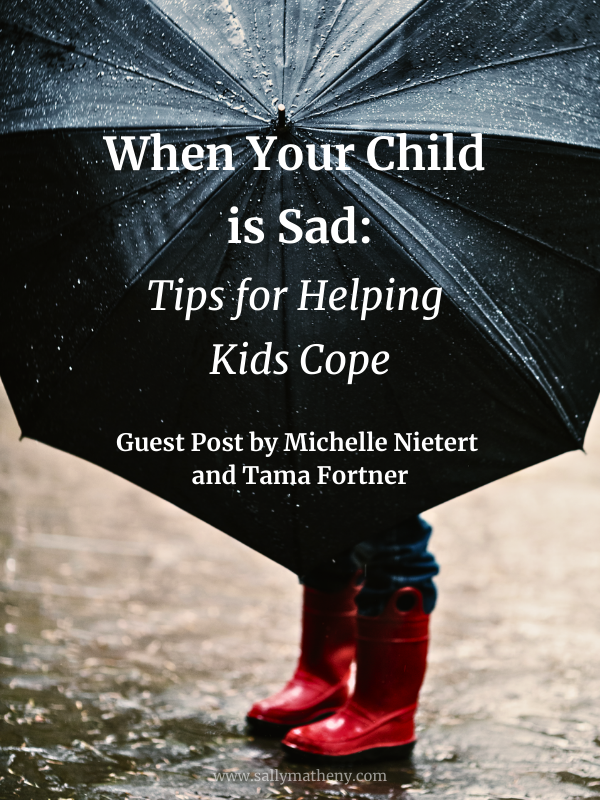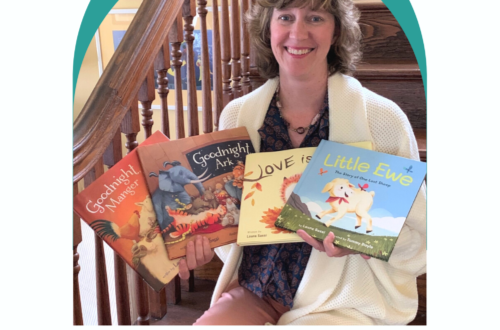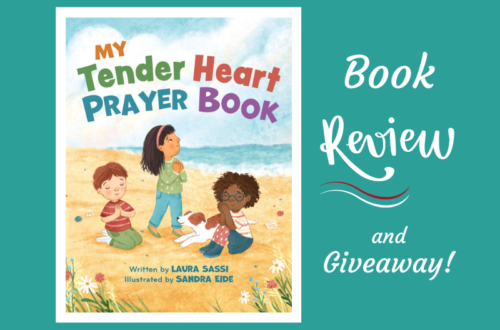
When Your Child Is Sad: Tips for Helping Kids Cope {Guest Post|
It’s heartbreaking when your child is sad. Do you need tips for helping kids cope with sadness? It’s my pleasure to introduce my guest authors for this blog post, Michelle Nietert, a licensed professional counselor, and Tama Fortner, an award-winning author. They have teamed up and have written a wonderful children’s book, GOD, I FEEL SAD. I have a review of that book coming up soon. For now, glean insightful tips and encouragement from Michelle and Tama.
When Your Child Is Sad: Tips for Helping Kids Cope
By Michelle Nietert & Tama Fortner
“The Lord is close to the brokenhearted” (Psalm 34:18, ICB).
We’ve all been there, haven’t we? Your child comes to you, face wet with tears and shoulders shaking with sobs. Or perhaps there are no tears—just that wounded look in their eyes. There are few things more heartbreaking than seeing your child feeling hurt and sad. Our first instinct is to rush to dry the tears and make everything better. Because we moms are fixers, right?
But making all their hurts and troubles disappear may not be what your child most needs.
Part of our job as parents is to teach our children to recognize and process their emotions in safe and healthy ways that not only honor what they’re experiencing, but also honor God. So instead of “making it all better,” try these steps instead:
Validate your child’s feelings.
How? By listening, really listening. Stop what you’re doing and get down on their level. Look them in the eyes and give them your full attention. Lean in, listening not just with your ears, but with your whole body.
Allow your child the time they need to find and use their words. Say things like, “What are you feeling?” “Tell me more,” and “Is there anything else you’d like to share?” Repeat your child’s answers back to them to make sure you’re understanding what they’re trying to share.
If your child is struggling to put their emotions into words, ask if they’d rather draw out what they’re feeling.
Reassure your child that’s it’s okay to feel what they’re feeling. Yes, even if it seems silly or trivial to you. Because kids need to know they can safely share their feelings with you. (And that you—together with God—are strong enough to handle whatever they bring to you.) These lessons they learn when dealing with the smaller disappointments in life can help them cope when the bigger sadnesses come along.
Name the feeling.
After your child has shared their feelings, help them find a word for that “level” of sadness. Is it disappointment? Are they feeling gloomy or blue or unhappy? Or are they heartbroken and devastated? (Teaching this kind of emotional vocabulary will be an asset for them their whole lives through.)
After naming the feeling, ask your child where they are feeling the sadness in their body. Is it tight in their throat or heavy on their shoulders? Is it spilling out in tears or does their tummy ache?
Note that people (of all ages) need at least ninety seconds to feel and process their emotions before they can move past them. Don’t rush through the listening and naming steps to get to the coping.
Guide your child through some calm-down (or coping) skills.
It’s important for children to learn to calm themselves and control their reactions. You can help by teaching different ways to cope with emotions, such as:
- taking slow, deep breaths
- going for a walk or a run outside
- running it out or dancing it out to a favorite tune
As your child learns the strategies that work best for them, they can begin to use these techniques on their own.

Turn it over to God in prayer.
Most importantly, teach your child to entrust their feelings to God and His care. Philippians 4:6 tells us to take everything to God in prayer. This is a wonderful time to model that. Ask if you can pray with them. Speak those words of blessing—the ones we all long to hear—over your child. Ask God for His comfort. Encourage (but don’t force) your child to add their own words of prayer. Reassure them that there is no emotion, no trouble too big for God to handle.
In this world, we are going to have troubles and sorrows (John 16:33, NLT), but we are loved by a God who not only bends down to listen when His children pray ( Psalm 116:1-2), but He also holds us close and comforts us with a peace so great that it’s impossible to understand ( Philippians 4:6–7). For more tips on helping your child cope with sadness, please check out the picture book God, I Feel Sad and visit www.GodIFeel.com.
*Please note, if your child is experiencing intense emotions that are interfering with daily life, consider seeking professional help from a Christian therapist or counselor who specializes in childhood mental health.
Michelle and Tama, thank you for sharing these helpful tips on ways we can help our kids cope with sadness. You both are a blessing to so many parents and their children. May the Lord continue to bless you and the work you do.
The Authors

Michelle Nietert has been a licensed professional counselor for over twenty-five years and is the coauthor of the award-winning book Loved and Cherished: 100 Devotions for Girls and Make Up Your Mind. A passionate speaker, she is a frequent guest on national television and podcasts, including her own “Raising Mentally Healthy Kids.” She and her husband, Drew, have been married almost two decades with two school-aged children. Connect with Michelle at www.YourMentalHealthCoach.com .
Tama Fortner is an ECPA award-winning and bestselling author with more than fifty titles to her credit, including Simply Christmas and Easter Is Coming!. She has collaborated with some of the biggest names in Christian publishing to create inspirational books for children, teens, and adults. But her greatest accomplishments happen in a happy little home on the outskirts of Nashville, Tennessee, where she lives with her family and a feisty little pup who is convinced he’s people too. To learn more, visit www.TamaFortner.com.





7 Comments
J.D. Wininger
Great counsel here ladies. Teaching our children/grandchildren the importance of taking things to God in prayer is so vitally important. I think too it’s important that they see us doing the same with those things in our lives. We are a living Bible, aren’t we? God’s blessings everyone. So appreciate this post.
Tama Fortner
Thank you, J.D.! And, yes, our own actions are a far more powerful witness than our words could ever be!
Pammy Martin
These are excellent helps for parents. As a parent of a child with chronic illness, he has dealt with anxiety for a couple of years. His counselor has helped him learn coping techniques. He is doing much better but still struggles at times (don t we all?).
As his parent (and having worked as a social worker) I do try to fix things. He and I just had a discussion in which he said to me that he really just needed me to listen without fixing and to give him some time. So what God is teaching me is that He is the One my son needs to learn on ultimately and I need to point him to prayer first and sometimes just be quiet and listen till asked for advice, or give short sentences of advice instead of long speeches :).
I think your book will help parents and kids. This blog post has already helped us!
Tama Fortner
It’s so hard for us mamas, isn’t it? We just want to make it all better! But it sounds like you’re doing a beautiful job of listening and pointing your son back to God. I’ll lift up my own prayer for you both. And thank you for your kind words!
Pingback:
Carol Baldwin
Excellent tips. So glad to see my daugher follow these steps with her own children!
Jean Hall
Thanks. This is terrific advice. I wish I had been armed with this when my children were little.
Jean